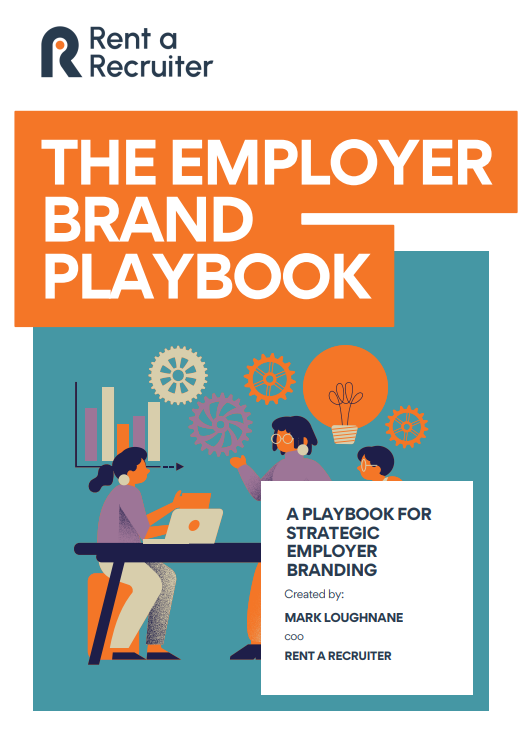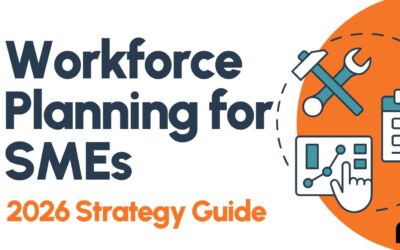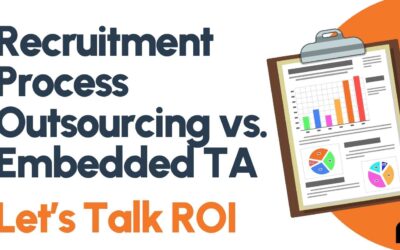Employer Branding Definition, Benefits and Strategies
Employer branding it’s a term you’ve likely heard often. But what does it mean, especially for small to medium-sized businesses (SMEs)?
Employer branding refers to how your business is perceived by potential and current employees. It includes everything from your website’s career page to employee reviews on platforms like Glassdoor and Indeed, and your social media presence. Simply put, it’s how you market yourself as an employer to attract, engage, and retain the best talent.
Importance of Employer Branding for Small and Medium-Sized Businesses
For SMEs, employer branding is crucial for standing out in a competitive job market. With larger companies offering attractive salaries, benefits, and perks, small businesses need to highlight their unique advantages, such as a more inclusive company culture, flexible working environments, and greater opportunities for personal growth. These are the factors that can turn potential candidates into loyal employees.
Employer branding isn’t just about attracting new talent. It also helps improve employee retention, reducing turnover costs and fostering a more committed workforce. For small businesses, where every hire counts, employer branding can make the difference between thriving and merely surviving.
Components of Effective Employer Branding
An effective employer branding strategy involves several key components that together shape the perception of your business.
Website Optimisation for Employer Branding
Your company’s website is the first place most candidates will visit when researching your business. Ensure that your career page reflects your company values, mission, and workplace culture. Include testimonials from current employees, videos of day-to-day life at the office, and detailed job descriptions. Offering a transparent and attractive portrayal of your business can inspire job seekers to apply.
Leveraging Social Media for Employer Branding
Social media is a powerful tool for employer branding. Platforms like LinkedIn, Facebook, and even Instagram provide opportunities to showcase your company culture, achievements, and team dynamics. Be consistent in your messaging, and don’t shy away from engaging with followers by responding to comments and messages. Sharing behind-the-scenes content, such as team events or employee spotlights, humanises your brand and strengthens its appeal.
Managing Online Reviews for Employer Branding
Sites like Glassdoor and Indeed can make or break your employer branding. Potential candidates often check these platforms to see how current and former employees rate their experience with your company. It’s vital to monitor and respond to reviews regularly—whether positive or negative. For negative feedback, show that you’re listening and willing to improve. For positive reviews, express gratitude. This interaction demonstrates transparency and commitment to employee satisfaction.
Writing Job Postings That Reflect Company Values
When writing job postings, it’s important to go beyond listing qualifications and responsibilities. Highlight what makes your company unique. Talk about your culture, values, and what a day in the life at your business might look like. This gives candidates a sense of who you are, making your posting stand out from countless others.

Barry Prost
Managing Partner
15 years’ experience recruiting senior managers for major international consultants and contractors. Barry is one of the founding directors of Propel. Prior to this, Barry worked for 10 years for Randstad, the 2nd largest recruitment organisation in the world. Managing teams across the UK and Ireland & delivering recruitment solutions to major clients. Barry is a graduate in International Business from Trinity College Dublin. He has a Masters in Business Administration (MBA) from the Smurfit School of Business.
“My favourite food is anything with quinoa”
Talent Attraction in a Competitive Market
Competing Against Larger Companies for Talent
In today’s market, SMEs face stiff competition from multinational corporations offering high salaries, stock options, and state-of-the-art offices. However, small businesses have their own strengths, such as a close-knit culture, opportunities for growth, and more flexibility. By focusing on these strengths and communicating them clearly, SMEs can appeal to talented candidates looking for more than just a paycheck.
Highlighting Unique Company Strengths and Culture
To attract talent, it’s essential to showcase the unique aspects of your business that make it a desirable place to work. Whether it’s a flexible work environment, strong community values, or opportunities for professional development, these should be emphasised early in the recruitment process. Employees today are looking for a company that aligns with their personal values and offers a sense of belonging.
Employer Value Proposition (EVP) for SMEs
Developing a Strong EVP for Small and Medium Businesses
An Employee Value Proposition (EVP) is the core of your employer branding. It’s the promise you make to your employees about what they can expect from working at your company. This includes everything from compensation and benefits to work-life balance and company culture. For SMEs, a strong EVP can help differentiate you from competitors and attract talent who are looking for more meaningful work.
The Role of Pay, Benefits, and Work Culture in Employer Branding
While larger companies may have the resources to offer higher salaries and more benefits, small businesses can focus on offering a better work-life balance, a more supportive company culture, and opportunities for personal growth. By focusing on these areas, SMEs can create a more attractive overall package for potential employees.
Strategies for Overcoming Talent Shortages
How SMEs Can Compete in a Talent-Short Market
The talent shortage in many industries means that businesses must work harder to attract and retain skilled employees. SMEs can overcome this challenge by focusing on what makes them unique and by offering non-monetary benefits that appeal to a modern workforce, such as flexible working arrangements and a positive company culture.
Developing Perks That Appeal to the Modern Workforce
Modern workers value perks that improve their quality of life, such as mental health support, professional development opportunities, and flexible working hours. Small businesses can develop these perks as part of their employer branding strategy to attract talent even in a competitive or talent-short market.
Managing Employer Branding Online
Building and Managing Your Online Employer Presence
Your online presence is critical for employer branding. This includes your website, social media accounts, and any employee review sites. Be proactive in managing your online reputation by creating engaging content, responding to reviews, and showcasing your company’s values and achievements.
Responding to Online Reviews and Feedback
Effective employer branding requires a proactive approach to managing reviews on platforms like Glassdoor. Acknowledging both positive and negative feedback demonstrates that your business values transparency and is committed to improving the employee experience.
Employer Branding for Staff Retention
How Employer Branding Helps Retain Top Talent
A strong employer brand not only attracts talent but also helps retain it. Employees are more likely to stay with a company that they feel proud to work for and that aligns with their values. SMEs can use employer branding to improve staff retention by fostering a supportive and engaging workplace culture.
Enhancing Employee Engagement Through Employer Branding
Employer branding can also improve employee engagement by creating a stronger connection between employees and the company. Regularly highlighting company achievements, recognising individual contributions, and fostering a sense of community can all contribute to higher levels of employee engagement.
Leveraging Employer Branding for Growth
Employer Branding’s Role in Business Expansion
As your business grows, employer branding becomes even more important. A strong employer brand can help attract the right talent to support your growth, improve employee retention, and enhance your overall reputation in the marketplace.
How SMEs Can Scale Employer Branding Over Time
Scaling employer branding efforts is essential as your company expands. Start by creating a solid foundation with a strong EVP and consistent messaging. As your company grows, continue to develop your employer branding strategy by integrating new technologies, expanding your online presence, and adapting to changes in the labour market.
The Role of HR in Employer Branding
Involving HR Teams in Employer Branding Initiatives
Your HR team plays a critical role in shaping your employer brand. From recruiting to employee engagement, HR should be involved in all aspects of employer branding. This includes gathering feedback from employees, managing the company’s online reputation, and ensuring that your EVP is consistently communicated across all channels.
Encouraging Feedback and Employee Engagement
Gathering employee feedback is a key part of employer branding. Regular surveys, exit interviews, and one-on-one discussions can provide valuable insights into what employees appreciate about working for your company and where improvements are needed. Encouraging feedback shows employees that their opinions are valued, which in turn enhances their engagement and loyalty.
Measuring the Success of Employer Branding
Key Metrics to Track for Employer Branding Success
Measuring the success of your employer branding strategy is essential to ensure that it’s effective. Key metrics to track include the number of job applications received, the quality of candidates, employee retention rates, and employee engagement scores. These metrics will help you determine what’s working and where improvements are needed.
Evaluating ROI of Employer Branding Efforts
Employer branding can be an investment, but it’s one that pays off in the long run. By tracking your employer branding metrics, you can evaluate the return on investment (ROI) and make informed decisions about where to focus your efforts.
Challenges and Common Pitfalls in Employer Branding
Common Employer Branding Mistakes for SMEs to Avoid
Some common mistakes that SMEs make with employer branding include ignoring negative online reviews, failing to communicate their company values, and not engaging with potential candidates through social media. Avoid these pitfalls by being proactive, consistent, and transparent in your employer branding efforts.
Overcoming Budget Constraints in Employer Branding
SMEs often operate with limited budgets, but employer branding doesn’t have to be expensive. Focus on leveraging low-cost, high-impact strategies, such as engaging with candidates on social media, improving your online presence, and building a positive company culture that resonates with employees.
Future Trends in Employer Branding for SMEs
The Evolution of Employer Branding Post-2024
As technology continues to evolve, so will employer branding. In the coming years, we can expect to see more companies leveraging AI and data analytics to refine their employer branding strategies. Additionally, remote work and flexibility will continue to be major factors in attracting talent.
Adopting New Technologies in Employer Branding Efforts
From virtual job fairs to AI-driven recruitment platforms, new technologies are changing the way businesses approach employer branding. SMEs should stay ahead of these trends by adopting tools that streamline the hiring process, enhance employee engagement, and improve their overall employer brand.
Employer Branding Resources
Practical strategies. Real-world insights. Actionable takeaways.
No-cost quick wins to elevate your brand perception immediately
Low-investment tools and tactics that deliver measurable results
Long-term strategies to build a sustainable employer brand that attracts and retains top talent
Real-life examples from businesses like yours
Employer Branding For SME’s FAQs:

What is employer branding for small businesses?
Employer branding refers to how a company presents itself to current and potential employees. For small businesses, it involves showcasing unique qualities such as company culture, flexibility, and opportunities for growth to attract talent.
Why is employer branding important for SMEs?
Employer branding helps SMEs compete with larger corporations for talent. It also improves employee retention and engagement, making it easier for smaller businesses to build a strong, committed workforce.
How can a small business improve its employer branding?
Improving employer branding can be done by developing a strong EVP, managing online reviews, using social media to showcase company culture, and creating a compelling career page on the company website.
What is an Employee Value Proposition (EVP)?
An EVP is a statement that summarises what a company offers to its employees, including benefits, culture, and growth opportunities. It’s a key part of employer branding and helps attract and retain talent.
How does employer branding impact talent attraction?
Employer branding plays a critical role in talent attraction by communicating what makes a company a desirable place to work. Strong employer branding can help small businesses stand out from competitors, even those offering higher salaries.
Can employer branding help with staff retention?
Yes, employer branding improves staff retention by creating a positive work environment where employees feel valued. Engaged employees are more likely to stay with the company long-term.
Rent a Recruiter, an award-winning outsourced recruitment provider, specialises in Talent Acquisition for IT, Engineering, Manufacturing, Construction, Finance, and Healthcare industries. Our seamless embedded solutions help you secure the talent your growing business requires.



